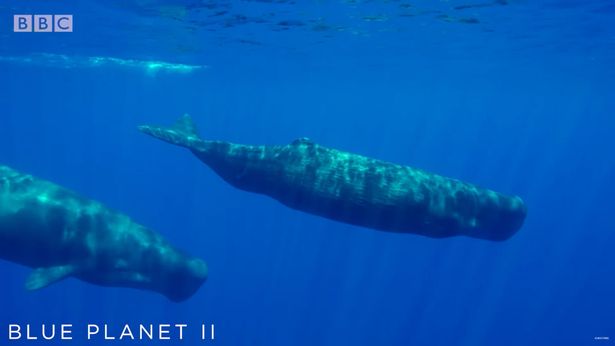Last week we explored the “Big Blue” – the wide expanses of oceans in which there are no visible coastlines and organisms are exposed to the elements. These conditions really test the marine animals which live in this foreboding environment. We observe some of the world’s largest mammals as they hunt prey and survive everyday life; a fleet of sperm whales dive down to extreme depths in search for giant squid. A sperm whale calf attempts to accompany its mother but struggles to hold its breath under the extreme pressure and is instead left exposed at the ocean’s surface whilst the rest of the family hunt in the pitch-black depths, using echo-location. Luckily the sperm whales return with stomachs full of squid, the mother can provide the calf with bucket-loads of nutrient rich milk.
Fun fact: many male sperm whales do most of hunting, they travel to extreme depths in search of giant squid, when one is snared in the whale’s mouth the whale races back to the surface. This act causes a rapid de-pressurization in the squid’s body, causing it to explode and provides easy pickings for the rest of the pod. However, this exerts a massive amount of stress on the males, causing their lifespan to be significantly reduced in comparison to the female’s span of 80 years.
We are then introduced to the importance of driftwood and debris which acts as a sanctuary for many smaller fish species, even a juvenile green turtle seeks shelter for a while whilst being stalked by a neighbouring shark. However, even in the middle of our oceans we are still reminded of the influence of plastics, with Attenborough naming plastics as “the biggest threat to ocean conservation, alongside the threat of global warming.”
The next predator we experience in the Big Blue are the swarms of jellyfish which travel across the world’s oceans along currents, stunning anything that comes in their path. The Portuguese man-of-war is something even more sinister; with giant tentacles which trail in the waters below it provides a lethal sting to anything which touches them, trapping up to 700 fish every day and absorbing the flesh using powerful chemicals. Even the cameramen were not able to avoid the tentacles, with several cases proving so bad that they had to seek pain relief! Despite most jellyfish having no brain and consisting for 95% water, they are extremely hardy creature, having existed on the planet for longer than the dinosaurs!
We come close to solving the mystery of where the largest fish in the ocean, the whale shark, raises its young. Although still unknown, many heavily-pregnant whale sharks are spotted near the Galapagos island as they travel to their mysterious breeding grounds. However, not all whale mothers are lucky enough to raise their young, the heart-breaking final scene shows how a pilot mother carries her dead calf, refusing the accept the death of her baby. It is believed that this was due to a build-up of toxic chemicals in the mother’s diet which was then transferred to the calf, through the process of bioaccumulation. As plastics break down they combine with other chemicals in an organism’s diet, reaching lethal levels as they work their way up the food chain, significantly affecting top predators like pilot whales.
As with the common theme of the rest of the series, Attenborough’s focus turns to the effect that humans are having on the world’s oceans. During the 6,000 hours spent filming this series, the Blue Planet team recorded all the plastic that they come in contact with. When the crew spotted a humpback whale tangled in 1km of fishing rope, they had to do something to help. Therefore, they spent 9 hours with the whale, removing the rope until it could freely move again. Reports indicate that eight million tonnes of plastic enter the oceans every year and only now are we starting to see the severity of its effect on the ecosystem.
Tonight, we visit the “Green Seas”, travelling through the kelp forests and following the journey of my favourite animal, the otter! Make sure that you stay tuned at 8pm because as always, I can guarantee it won’t disappoint.
James Deed
Image: BBC

